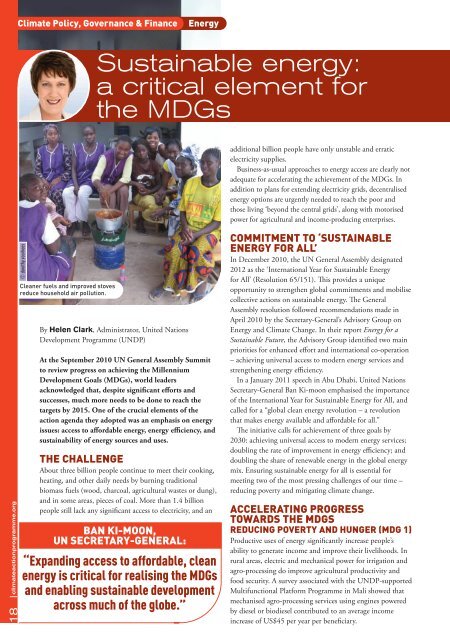Climate Action 2011-2012
Create successful ePaper yourself
Turn your PDF publications into a flip-book with our unique Google optimized e-Paper software.
climate policy, governance & finance<br />
energy<br />
Sustainable energy:<br />
a critical element for<br />
the MDGs<br />
additional billion people have only unstable and erratic<br />
electricity supplies.<br />
Business-as-usual approaches to energy access are clearly not<br />
adequate for accelerating the achievement of the MDGs. In<br />
addition to plans for extending electricity grids, decentralised<br />
energy options are urgently needed to reach the poor and<br />
those living ‘beyond the central grids’, along with motorised<br />
power for agricultural and income-producing enterprises.<br />
18 climateactionprogramme.org<br />
© dorothy.voorhees<br />
Cleaner fuels and improved stoves<br />
reduce household air pollution.<br />
By Helen Clark, Administrator, United Nations<br />
Development Programme (UNDP)<br />
At the September 2010 UN General Assembly Summit<br />
to review progress on achieving the Millennium<br />
Development Goals (MDGs), world leaders<br />
acknowledged that, despite significant efforts and<br />
successes, much more needs to be done to reach the<br />
targets by 2015. One of the crucial elements of the<br />
action agenda they adopted was an emphasis on energy<br />
issues: access to affordable energy, energy efficiency, and<br />
sustainability of energy sources and uses.<br />
The challenge<br />
About three billion people continue to meet their cooking,<br />
heating, and other daily needs by burning traditional<br />
biomass fuels (wood, charcoal, agricultural wastes or dung),<br />
and in some areas, pieces of coal. More than 1.4 billion<br />
people still lack any significant access to electricity, and an<br />
ban Ki-moon,<br />
un SecreTary-general:<br />
“Expanding access to affordable, clean<br />
energy is critical for realising the MDGs<br />
and enabling sustainable development<br />
across much of the globe.”<br />
commiTmenT To ‘SuSTainable<br />
energy for all’<br />
In December 2010, the UN General Assembly designated<br />
<strong>2012</strong> as the ‘International Year for Sustainable Energy<br />
for All’ (Resolution 65/151). This provides a unique<br />
opportunity to strengthen global commitments and mobilise<br />
collective actions on sustainable energy. The General<br />
Assembly resolution followed recommendations made in<br />
April 2010 by the Secretary-General’s Advisory Group on<br />
Energy and <strong>Climate</strong> Change. In their report Energy for a<br />
Sustainable Future, the Advisory Group identified two main<br />
priorities for enhanced effort and international co-operation<br />
– achieving universal access to modern energy services and<br />
strengthening energy efficiency.<br />
In a January <strong>2011</strong> speech in Abu Dhabi, United Nations<br />
Secretary-General Ban Ki-moon emphasised the importance<br />
of the International Year for Sustainable Energy for All, and<br />
called for a “global clean energy revolution – a revolution<br />
that makes energy available and affordable for all.”<br />
The initiative calls for achievement of three goals by<br />
2030: achieving universal access to modern energy services;<br />
doubling the rate of improvement in energy efficiency; and<br />
doubling the share of renewable energy in the global energy<br />
mix. Ensuring sustainable energy for all is essential for<br />
meeting two of the most pressing challenges of our time –<br />
reducing poverty and mitigating climate change.<br />
acceleraTing progreSS<br />
TowardS The mdgS<br />
reducing poverTy and hunger (mdg 1)<br />
Productive uses of energy significantly increase people’s<br />
ability to generate income and improve their livelihoods. In<br />
rural areas, electric and mechanical power for irrigation and<br />
agro-processing do improve agricultural productivity and<br />
food security. A survey associated with the UNDP-supported<br />
Multifunctional Platform Programme in Mali showed that<br />
mechanised agro-processing services using engines powered<br />
by diesel or biodiesel contributed to an average income<br />
increase of US$45 per year per beneficiary.












